OVERVIEW
Family resilience is the ability to develop and grow strengths together that can help you all meet life’s challenges, be able to work through them in a positive way and emerge stronger in the process*.
We are all under the dark cloud of the COVID-19 pandemic. Adversity and crises can lead a family into conflict. But they can just as easily create an opportunity for the family to strengthen their resilience against stressful changes in life. Family resilience based on trust and open communication can help us all work through life’s challenges.
Parent
1. TAKE CARE OF YOURSELF
As parents, we have the responsibility to take care of our children but it’s also essential for us to look after our own wellbeing. Children pick up on their parents’ emotions. So as a rule of thumb, if you’re happy, they also experience that positive energy.
To take better care of ourselves as a parent, we recommend:
- Family activities that enhance communication, such as sports and board games
- Private time for yourself as a parent (click here to Comics to learn more). Take a break from time to time. It’s okay to do nothing and rest
For more tips on taking care of yourself, please click here.
2. COMMUNICATION IS KEY
The COVID-19 pandemic, as well as other major events can create various types of psychological distress for all family members, including the children. The key is to talk to them to provide support and a sense of security in difficult times.
With Little Children
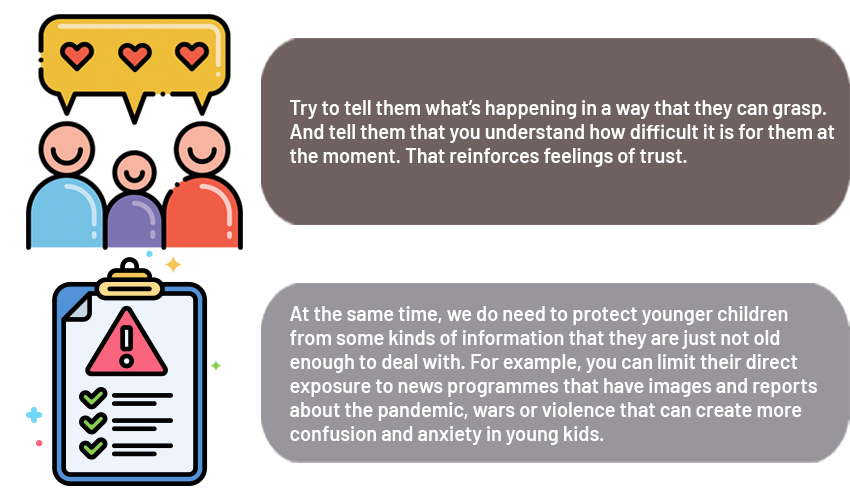
Click here to know more how to communicate with children about COVID-19.
With Teenagers
Try to guide them towards credible and verified news sources, to help them avoid inaccurate and misleading information that may lead to worries or fears. Talk to them about accepting negative feelings such as uneasiness and sadness that they might have when reading/watching the news. Comfort them by letting them know it is okay to have these feelings. To keep their levels of self-esteem and creativity high, do plenty of family activities (click here to Comics to learn more) together.
3. STRESS IS NORMAL
We all encounter stress from time to time, it’s a normal part of life.
You can feel the changes in your body when you are stressed. These signs can be headaches, changes in appetite or trouble falling asleep.
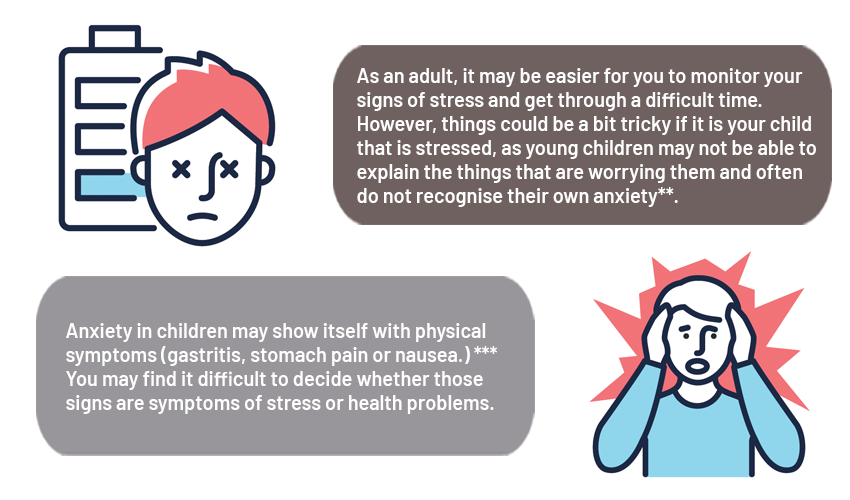
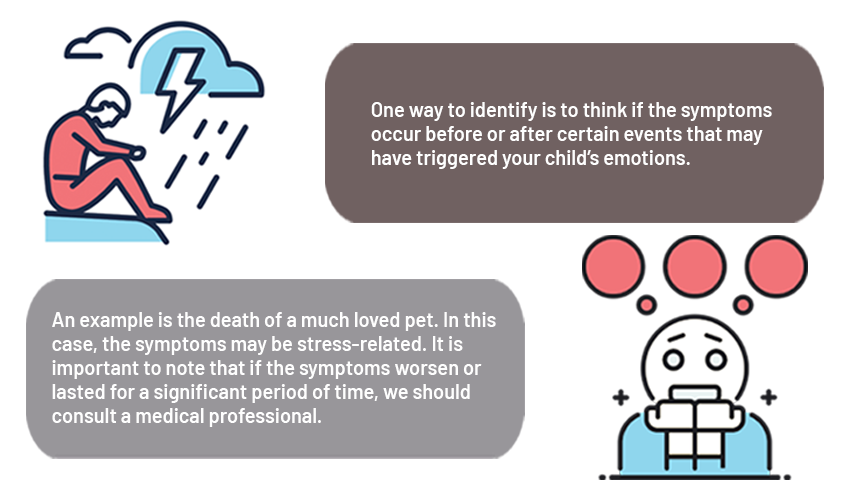
Feeling stressed for a short period of time can be helpful as a way for us to “survive” and protect ourselves or others from a perceived threat.
Special for you: Comics: We are Family (click here to learn more)
CARITAS FAMILY
CRISIS HOTLINE
18288
BAPTIST OI KWAN SOCIAL SERVICE 25354135
Emotional Support and Mental Health consultation hotline
YOUTH OUTREACH HOTLINE
90881023
For youth aged 24 or below
HONG KONG RED CROSS
"Shall We Talk"
(by Appointment Only)
Psychological Support Service
Hong Kong Christian Service Counseling hotlines
5724 0270
Emotional Support and Mental Health consultation hotline (By Appointment via phone only)
If your situation gets worse, please ask for professional help.
preschool
It can be difficult for toddlers or young children to express their stress. As a parent, we need to pay attention to changes in their behaviour. Here are some examples:
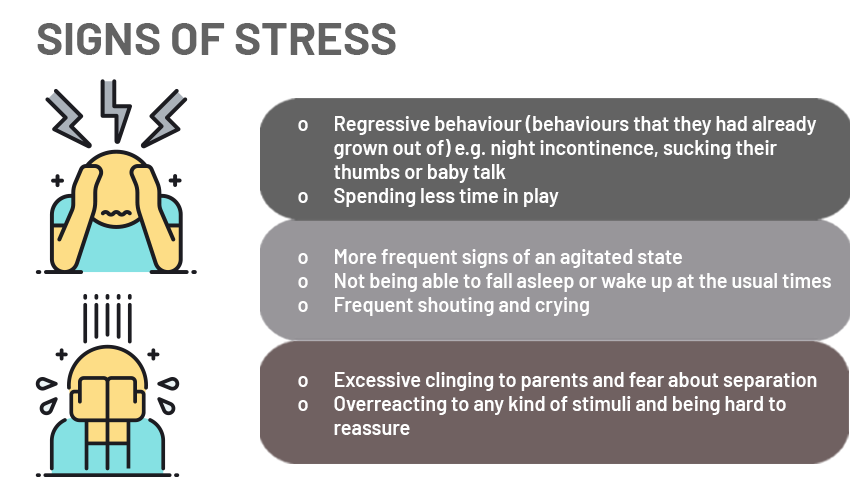
TIPS FOR PARENTS

- Maintain regular eating and sleeping routines
- Keep them in a relaxed environment
- Speak to them in a calm voice, at a normal volume
- Cuddle and hug them (click here to Comics to learn more)
- Play and laugh with them, read them stories
It can be hard for young children to express their feelings of stress. Try to comfort them by providing more attention and physical affection.
Special for you: Comics: We are Family (click here to learn more)
CARITAS FAMILY
CRISIS HOTLINE
18288
BAPTIST OI KWAN SOCIAL SERVICE 25354135
Emotional Support and Mental Health consultation hotline
YOUTH OUTREACH HOTLINE
90881023
For youth aged 24 or below
HONG KONG RED CROSS
"Shall We Talk"
(by Appointment Only)
Psychological Support Service
Hong Kong Christian Service Counseling hotlines
5724 0270
Emotional Support and Mental Health consultation hotline (By Appointment via phone only)
If your situation gets worse, please ask for professional help.
PRIMARY SCHOOL
In stressful moments, some children may experience a heightened intensity of emotions such as fear and worry. Let’s take a look at some ways to help these emotional changes.
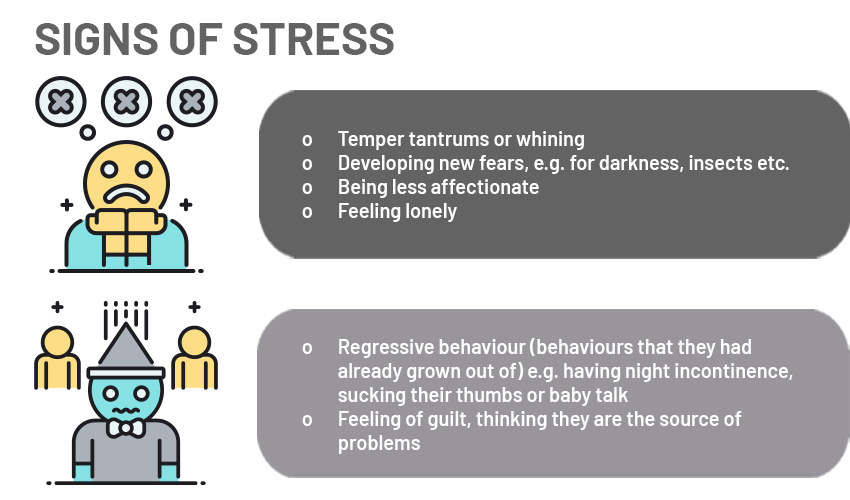
TIPS FOR PARENTS

- Maintain regular eating and sleeping routines
- Give them more time and attention (click here to Comics to learn more)
- Give yourself some private time and give the child time to play alone
- Help them maintain a daily routine, e.g. getting dressed for activities even if you are not going out.
- Allow them to stay near you if they are afraid or clingy
- Be patient with children who begin to show regressive behaviours
- Share activities with them, listen to them
For children, the rule is that if the parents feel well, the children do too.
Special for you: Comics: We are Family (click here to learn more)
CARITAS FAMILY
CRISIS HOTLINE
18288
BAPTIST OI KWAN SOCIAL SERVICE 25354135
Emotional Support and Mental Health consultation hotline
YOUTH OUTREACH HOTLINE
90881023
For youth aged 24 or below
HONG KONG RED CROSS
"Shall We Talk"
(by Appointment Only)
Psychological Support Service
Hong Kong Christian Service Counseling hotlines
5724 0270
Emotional Support and Mental Health consultation hotline (By Appointment via phone only)
If your situation gets worse, please ask for professional help.
Adolescents
Teenagers are at the stage of becoming more in touch with their emotions and their surroundings. Stressful events may increase their psychological distress. Let’s learn about some of their needs and ways to support them effectively.
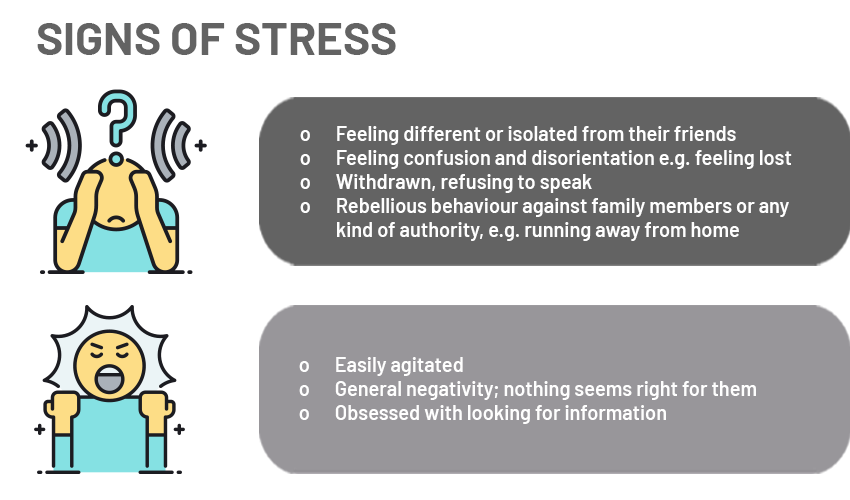
TIPS FOR PARENTS

- Allow them to be sad. Don’t expect them to stay happy all the time
- Listen to their thoughts and fears, without judging them
- Define the rules and clear boundaries for the whole household. For example, no phones during dinner.
- Ask them what difficulties they are facing, if they don’t want to talk, give them space and ensure help is around if they need it (click here to Comics to learn more).
- Give them your time and your attention
- Let them have their private spaces and time, respect their privacy (click here to Comics to learn more).
- Do activities with your children, like sport
- Give them the facts about what is happening and explain what it means
- Allow them to keep informed but not drowned in news
- For some, it might be important to dress well, put on make-up, etc. even if they are home. Let them do it without criticising them
It’s important to accept negative thoughts too. Try doing activities together to keep their self-esteem and creativity levels high.
Special for you: Comics: We are Family (click here to learn more)
CARITAS FAMILY
CRISIS HOTLINE
18288
BAPTIST OI KWAN SOCIAL SERVICE 25354135
Emotional Support and Mental Health consultation hotline
YOUTH OUTREACH HOTLINE
90881023
For youth aged 24 or below
HONG KONG RED CROSS
"Shall We Talk"
(by Appointment Only)
Psychological Support Service
Hong Kong Christian Service Counseling hotlines
5724 0270
Emotional Support and Mental Health consultation hotline (By Appointment via phone only)
If your situation gets worse, please ask for professional help.
Reference:
*Walsh, F. (2011). Family resilience: a collaborative approach in response to stressful life challenges. Resilience and mental health: Challenges across the lifespan, 149-161.
** Stress in childhood. (2018) US National Library of Medicine, MedlinePlus.
*** Krohne, H. W. (1990). Developmental conditions of anxiety and coping: A two-process model of child-rearing effects. Psycholog. Inst., Abt. Persönlichkeitspsychologie.

